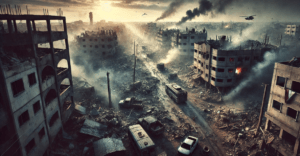38 Killed in Gaza as Israel Strikes; Palestinian Fighters Respond with Rockets
In the past 24 hours, Israeli attacks on Gaza have killed at least 38 Palestinians, with one more body recovered from the rubble, according to Gaza’s Health Ministry. The UN reports that since March 18, approximately 142,000 Palestinians have been forcibly displaced. Israel claims to have killed a fighter responsible for launching projectiles toward its territory and says it struck the launch site along with two other locations, though it did not specify where. Meanwhile, Israeli authorities ordered residents of Gaza City’s Zeitoun, Tal al-Hawa, and Sheikh Ijlin neighborhoods to evacuate.
Earlier, Israel reported intercepting one rocket from Gaza while another landed in the Zimrat community. The armed wing of the Palestinian Islamic Jihad, al-Quds Brigades, claimed responsibility, stating the attack was in retaliation for Israeli strikes. The violence continues to escalate, with Palestinian civilians suffering amid ongoing airstrikes and mass displacement.

38 Killed in Gaza as Israel Strikes; Palestinian Fighters Respond with Rockets
Over the past day, Israeli military strikes in Gaza have killed at least 38 Palestinians, according to Gaza’s Health Ministry. This toll includes one body recently recovered from the rubble of destroyed buildings. The United Nations humanitarian office (OCHA) reports that since Israel resumed its military offensive on March 18, approximately 142,000 Palestinians have been forced to flee their homes, worsening the humanitarian crisis in the region.
The Israeli military states that its recent attacks targeted a militant allegedly responsible for launching rockets toward Israeli towns near Gaza. It also claims to have destroyed the launch site used in the attack, along with two other locations linked to similar activities. However, the military has not provided specific details on where these strikes took place. Meanwhile, Israeli authorities have issued evacuation orders for residents of several Gaza City neighborhoods, including Zeitoun, Tal al-Hawa, and Sheikh Ijlin. These directives have left families scrambling for safety, though many fear that nowhere in Gaza is truly secure amid ongoing airstrikes.
Earlier, Israel’s defense systems intercepted one rocket fired from Gaza, while another landed in an open area near the Zimrat community, causing no injuries. In response, the al-Quds Brigades—the armed wing of the Palestinian Islamic Jihad—claimed responsibility, stating that they launched rockets at Israeli settlements as retaliation for what they described as “continued Israeli aggression.” The group emphasized that their attacks were in direct response to Israeli airstrikes and the increasing civilian death toll.
The situation remains highly volatile, with no signs of de-escalation. Displaced families in Gaza continue to endure dire conditions, lacking access to adequate shelter, food, and medical care. Many are seeking refuge in overcrowded schools or makeshift tents, while others have been displaced multiple times since the conflict began. International aid organizations have repeatedly called for a ceasefire and urgent humanitarian access, but their appeals have largely gone unanswered.
The latest evacuation orders in Gaza City have drawn criticism from human rights organizations, which argue that forcing civilians to flee under threat of bombardment violates international law. Advocates also highlight the particular hardships faced by vulnerable groups, including the elderly, disabled, and children, who struggle to relocate quickly. While Israel maintains that these warnings are issued to minimize civilian casualties, critics argue that the repeated displacement and destruction of infrastructure amount to collective punishment.
Casualty figures provided by Gaza’s Health Ministry include both combatants and civilians, though specific breakdowns are often unclear. Israel insists its operations focus on militant targets and accuses groups such as Hamas and Islamic Jihad of using civilians as human shields. Palestinian factions deny these claims, asserting that Israel deliberately targets residential areas.
The cycle of violence has persisted for months, with brief lulls followed by renewed fighting. Efforts by international mediators to secure a lasting ceasefire have stalled, leaving civilians on both sides trapped in a deadly impasse. In Israel, communities near Gaza remain on high alert for rocket attacks, while in Gaza, families mourn their losses and grapple with the trauma of relentless airstrikes.
As the conflict drags on, the humanitarian toll in Gaza continues to worsen. Overwhelmed hospitals struggle to treat casualties amid shortages of medical supplies and electricity. Water and sanitation systems are nearing collapse, raising fears of disease outbreaks. With no political resolution in sight, the people of Gaza face an uncertain future, marked by fear, loss, and an ever-deepening humanitarian crisis.
You must be logged in to post a comment.